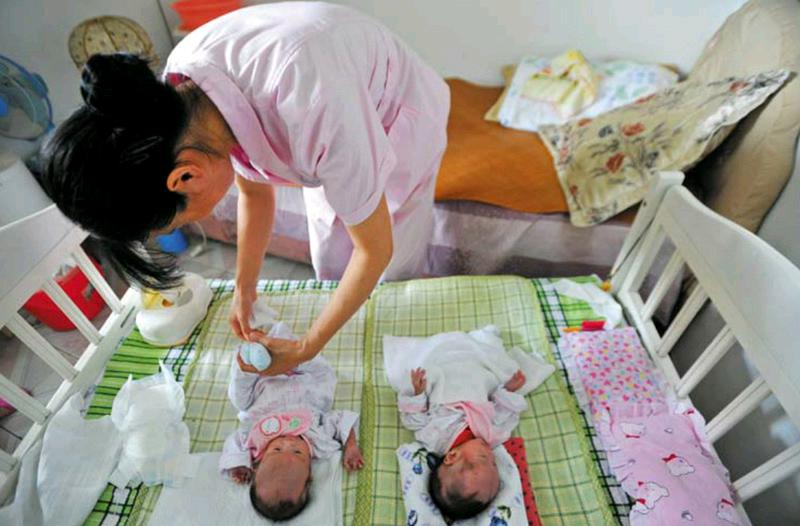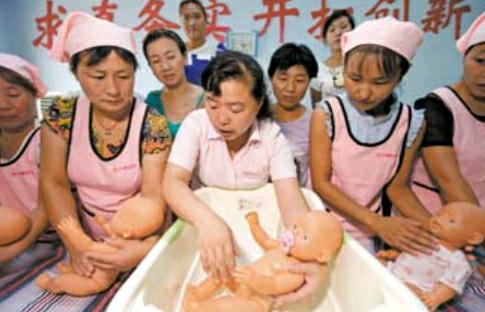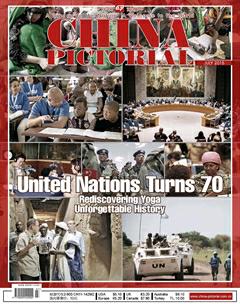Baby Industry Boom
by+Chong+Yatu
Its a tradition for new Chinese moth- ers to stay indoors for a month or two after childbirth to recover. Traditionally, her parents take responsibility for caring for both the mother and infant. With stretched geography in the modern era, things are different: More young parents hire professional maternity nurses to look after the new mother and infant, birthing a new profession – confinement nursing, which has proven increasingly lucrative.
Finding a Perfect Fit
Huang Jing, a resident of Chaoyang District, Beijing, is due to give birth in July. She has been hunting for nurses. “I only have a handful of choices after checking out several companies,” Huang sighs. “I hoped to compare my options. I might have to pay around 10,000 yuan (US$1,600) to get someone experienced.”
Huang Jing is not alone. Potential parents born in the 1980s have developed different ideas about “postpartum confinement” than their parents, evidenced by the emergence of confinement nurses. The younger generation feels that such nurses bring professionalism and comfort, freeing new parents from stress.
Such sentiments created a void in the market. In 2005, maternity nursing became a government-approved occupation, and the government stipulated that such professionals needed a vocational certificate after occupational training.
In 2015, the government loosened its family planning policy to allow a second child for couples with either the husband or wife being an only child, which exploded demand for confinement nurses in many major metropolises. The trend is especially popular in Beijing and Shanghai, where expecting parents must book a nurse at least six months in advance in order to ensure a highly-experienced professional.
Short supply of such professionals has pushed up the costs. For instance, a document from Beijing Association of House- hold Management Service reveals that in 2014, the low end of maternity nursesmonthly salaries sat at about 6,000 yuan, while the maximum reached 15,000 yuan, excluding service charges and the administrative costs of intermediaries. The lowest salaries in mid-sized cities measure around 5,000 yuan. The earnings of many whitecollar professionals pale in comparison to such an income.
Another reason for the choice more frequently made by many young parents is that their parents are not physically able to provide the necessary support. “Its a lot of work to look after both the young mother and baby,” explains Tian Minyu from Shanghai. “My parents are getting old, so it would pain me to push them so hard.”
A High-Pressure Job
Indeed, the good pay doesnt come easy. Many agencies supplying confinement nurses declare that caring for young mothers and newborns is not simply about skill, but hard work. Generally speaking, a nurse works 26 days a month, during which time she must live with the client and look after the mother and child around the clock. Its certainly not a job that appeals to everyone.
“I have to get up whenever the baby cries no matter how deeply Im dreaming,”reveals Li Yimin, one of the Top Ten Stars of Household Management Services in Chengdu, the provincial seat of Sichuan. At age 45, Li has been serving as a maternity nurse for three years. She has received sterling reviews from her clients for her strong sense of responsibility and excellent performance, winning her monthly income of over 10,000 yuan.
“The job is simple, actually,” remarks Li. “Whenever a problem arises, you dont hesitate and solve it right away. This philosophy is even more important when youre sharing the same roof with the cli- ent: I must learn how to get along well with the young mother and her family. Its not all about taking good care of the mother and baby. After all, Im a stranger sharing a month or so with the family. So, it is especially crucial to get along and communicate well, to trust, and to understand.”
The majority of such workers are housewives aged 40 to 50 due to the demands of the job. “They have passion and patience after experiencing everything from pregnancy to delivery,” illustrates Xiao Zhewen, founder of Haoyunmom, a well-known Chinese brand supplying maternity nurses.“Still, they maintain enough energy to form the backbone of such an industry.”
Derivative Industries
The rise of maternity nursing has spawned upswings in related fields such as vocational training.
On April 16, 2015, a training class in Pudong New District, Shanghai, attracted more than 40 attendees, who meticulously took notes. The three-hour class was only one of numerous programs offered by Love Yuebao Household Management Service Center.
Every year, the center presents more than 10 training classes taught by experts in pregnancy and infant care, at prices ranging from several hundred up to 1,000 yuan. Those who pass the accompanying tests are granted course-completion certificates and recommended to employers. Over 100 such agencies now operate in Shanghai, according to a representative of Love Yuebao.
Aside from training classes, “confinement apartments” have emerged in some metropolises to provide postpartum rehabilitation services, special meals for young mothers prepared by nutritionists, consultation on feeding newborns, and professional nursing of infants.
“The term ‘maternity nurse didnt really emerge until 2005, nor did any derivative industries,” notes Professor Hu Guangwei, a sociologist from the Sichuan Branch of the Chinese Academy of Social Sciences. “Today, however, over 1 million agencies and companies associated with maternity services have set up shop and created 5 to 6 million jobs. The trend represents the individualization and market impact of Chinas social demands.”
Still, concerns about service quality persist as the maternity industry thrives. Turnover in such a profession is high due to a lack of benefits or long-term security. Challenges await for the future development of maternity nursing.

